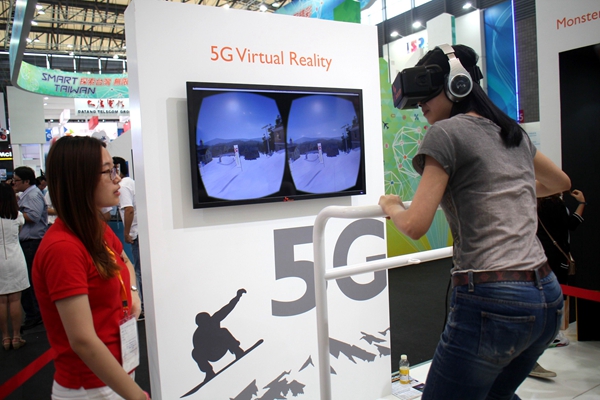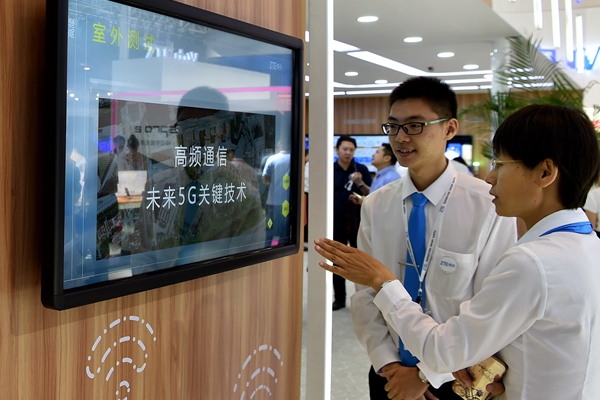
A consumer experiences a virtual reality game device that applies 5G technology at a high-tech fair held in Shanghai in May last year.[Photo/China Daily]
Chinese telecom firms have scored a point in the global race to set standards for 5G, the fifth-generation mobile communication technology that will allow consumers to download an 8-gigabit movie in seconds.
China Mobile Communications Corp, the world’s largest telecom carrier by subscribers-with 845 million subscribers by October, beat foreign competitors in late November to lead the 5G System Architecture project, which will determine the “structure of 5G networks”.
The move came shortly after polar coding, a technology backed by Chinese telecom equipment maker Huawei Technologies Co Ltd, was approved as part of the global standard for 5G.
“The progress highlights Chinese firms’ rising influence in the global telecommunication arena. It is a recognition of both their technological prowess as well as their brand influence,” said Xiang Ligang, CEO of the telecom industry website cctime.com.
China is evolving from a follower in the 3G era to an active participant that seeks to outcompete foreign firms in the 5G era, he added.
The trend dovetails with the rise of Chinese telecom firms in the international arena. Huawei emerged as the world’s leading telecom equipment maker, whose products and services are exported to more than 170 countries and regions, covering one-third of the global population.
The country has also built the world’s largest 4G networks within two years. As of October 2016, China Mobile alone had 497 million 4G subscribers and its 4G base stations exceeded 1.43 million units, both the world’s largest.
Dwelling on these achievements, Chinese players are now seeking to grow their influence as the world is migrating to the new 5G era, where unlike previous generations, there will be only one global standard.
In late November, Sun Tao of the China Mobile Research Institute became the sole rapporteur for the 5G System Architecture project at a meeting held by 3rd Generation Partnership Project, the international mobile telecommunications standard organization in the United States.
“The rapporteur means the one who takes charge of the project. Winning the title from a crowd of competitors proves that China Mobile’s thinking on 5G system architecture design has been well-received among the global community,” said Fu Liang, an independent analyst who has been following the telecom industry for more than a decade.
“The architecture design of the 5G system is just like the structure of housing. It determines the functionality of the whole building,” he added.
Sun said in a statement to China Daily that “China Mobile will be responsible for the whole project. We will decide its timeline, organize discussions on technical specifications and coordinate views of different parties.”
According to him, the project will release two documents in next December, which will form a global standard for 5G system architecture.

Huawei Technologies Co Ltd displays its latest achievements in 5G technology at the PT/EXPO China held in Beijing in September. The exposition showed the trends in the fields of 5G technology, cloud computing, the internet of things and smart hardware.[Photo/Xinhua]
“The role will give us a leg up in the 5G era, laying a sound foundation for our efforts in artificial intelligence and the internet of things,” Li Zhengmao, vice-president of China Mobile, said.
Huawei is also expected to have an edge, after polar coding was approved as part of the global standard for 5G at another meeting held by the 3rd Generation Partnership Project in November.
The technology can help lower chip power consumption and improve reliability of wireless communications, Huawei said. It will better support cloud computing, high-definition movie streaming, augmented reality and other services that demand superfast internet speed.
“Though polar coding was developed by a Turkish scientist, Huawei has played a big part in promoting it as part of the 5G standard. It has already conducted a great deal of pioneering research and tests on it. Huawei will have the first-mover advantage,” said Xiang, CEO of the telecom industry website cctime.com.
But that does not mean the efforts to set a global 5G standard are a zero-sum game. Hu Houkun, Huawei’s rotating chief executive, said in an interview with Financial Times: “I think this is not a fight between different companies, let alone different countries. Rather, it is a process of building consensus in the mobile industry.”
